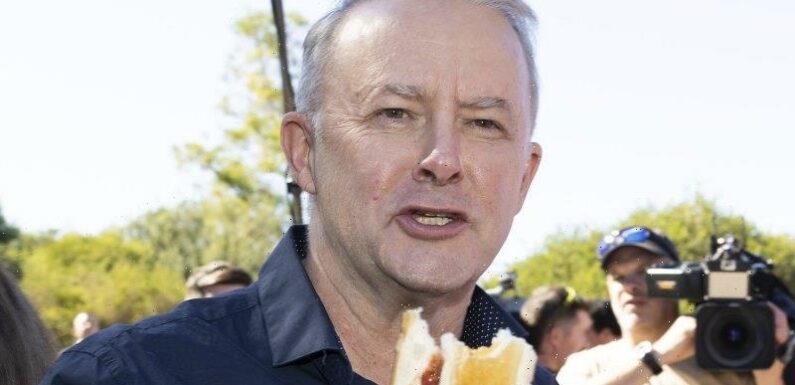
Not long after news broke that the Australian government was considering signing a global pledge to reduce methane emissions, Nationals leader David Littleproud was getting hot under the collar.
“Australians are already hurting with petrol prices, electricity prices and food prices,” he said in a press release on Thursday morning suggesting any new impost on farmers would hit families at the checkout.
Labor’s current and former leaders – Bill Shorten, and Anthony Albanese – at a barbecue with party supporters in the lead-up to the May federal election.Credit:Alex Ellinghausen
“Now the Aussie barbecue is under threat. Prime Minister Anthony Albanese wants to take away the backyard barbecue.
“We know Australians love their sausages, steaks, rissoles and lamb meals – all of that will become out of reach for many. We do not want to see the Aussie barbecue available to only the rich – we urge Labor to reject the methane madness idea and embrace the Aussie barbecue spirit instead of destroy it.”
If fact, Albanese is about as interested in pinching peoples’ sausages as former Labor leader Bill Shorten was in stealing the weekend when he was clobbered with a scare campaign over electric vehicle policy before the 2019 election.
Littleproud was fuming about reports Australia may join what is known as the Global Methane Pledge, an agreement by more than 110 countries to collectively reduce methane emissions by at least 30 per cent below 2020 levels by 2030.
But unlike national emissions-reduction targets, which are binding under the United Nations’ climate treaty, the methane pledge is just that – a promise to reach a goal and to share information on technology among the signatories to help each other do so.
Furthermore, even if Australia were to sign up to the pledge, it is less ambitious than the nation’s existing target of reducing overall emissions by 43 per cent of 2005 emissions by 2030, and far less ambitious than the target embraced by much of the nation’s agricultural sector of reaching net zero by 2030.
So why does it matter?
In practical terms, it matters because methane is intensely destructive to the climate.
Over a 20-year period, methane has more than 80 times the heating power of carbon dioxide in the atmosphere. It is estimated to be responsible for almost a third of global warming since pre-industrial times.
On the upside, once in the atmosphere, methane deteriorates far faster than carbon dioxide, which can hang about reflecting heat back at us for 100 years. This means reducing methane emissions helps stabilise the climate faster than cutting carbon dioxide emissions, though both are critical.
Curbing methane is low-hanging fruit in climate policy.
The main sources of methane are leakage from fossil-fuel infrastructure, agriculture and landfills. As a result, Australia emits more than its fair share.
The second reason why it matters is diplomatic.
This government is of the view that more ambitious climate policy puts Australia in better international standing in a world where reduced stability means international friendships are growing ever more important.
The pledge was launched at the last global climate talks in Glasgow and championed by the United States which, since the election of President Joe Biden, has again become an activist on climate change.
Under the previous Morrison government, Australia chose not to sign the pledge, to the frustration of the US.
Today, weeks before the next UN climate talks, known as COP27, start in Egypt, the outlook for agreement on ambitious action is looking even grimmer. In the midst of an energy crisis, Europe’s focus has shifted. Boris Johnson, a conservative climate champion, has been replaced by Liz Truss as Britain’s prime minister, while conservative leaders have been elected in nations such as Italy.
In this context, the methane pledge looks like an obvious option to signal co-operation.
By late on Thursday afternoon, Climate Change and Energy Minister Chris Bowen confirmed the government was “consulting across resources and agricultural sectors about signing up to the Global Methane Pledge”, which he described as an “aspirational global goal” rather than a target.
The National Farmers’ Federation said in a statement it was in discussions with the government about the pledge too, adding it had sought and received assurances that it would not lead to new taxes or regulation on livestock methane.
For now at least, it seems the sausages are safe.
Get to the heart of what’s happening with climate change and the environment. Our fortnightly Environment newsletter brings you the news, the issues and the solutions. Sign up here.
Most Viewed in Politics
From our partners
Source: Read Full Article
